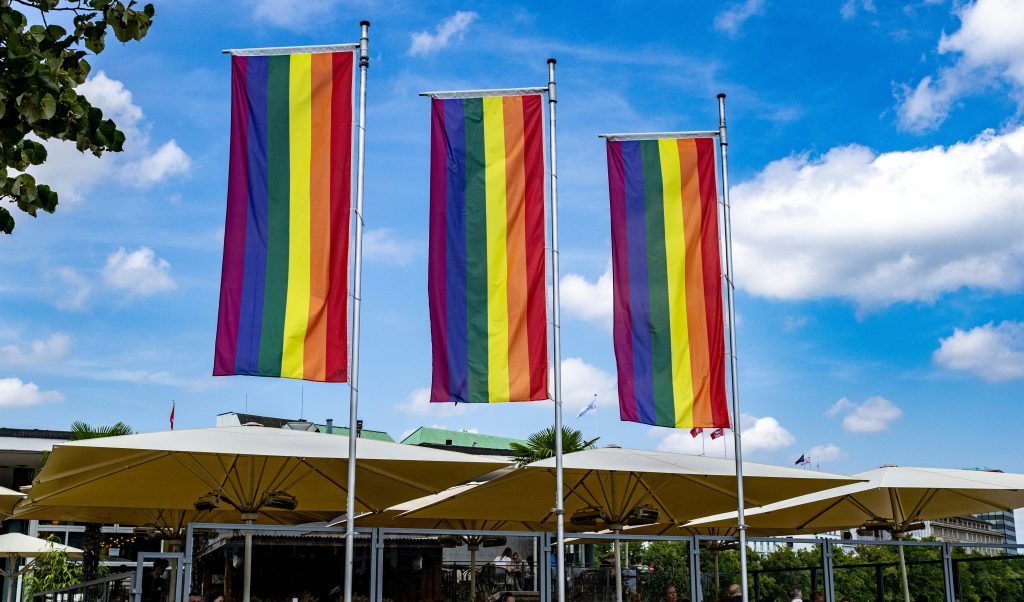Homophobic Threats Target WNBA Star’s Family Amidst Playoff Tensions
In a shocking turn of events following the New York Liberty’s recent playoff game, star player Breanna Stewart and her wife, former WNBA player Marta Xargay Casademont, have become victims of homophobic threats. The couple received anonymous emails containing disturbing messages, including a death threat directed at Xargay, which has prompted an investigation by the New York Police Department (NYPD). Stewart, who has been a pivotal player for the Liberty, expressed her concern about the safety of her family and the emotional toll these threats have taken.
The incident occurred after the Liberty’s defeat in Game 1 of the WNBA playoffs, a loss that already carried significant pressure for the team and its players. Stewart, known for her resilience on the court, now finds herself grappling with the harsh realities of off-court challenges that extend beyond the game. “Marta had gotten homophobic death threats. A few other things have happened. Just making sure we’re doing as much as possible to ensure our team and the organization are safe,” Stewart stated, highlighting the need for vigilance and support in these trying times.
This alarming situation has sparked discussions about the safety and mental well-being of athletes, particularly those in the LGBTQ+ community. The threats are a stark reminder of the discrimination that still exists in sports and society at large. As Stewart continues to address these issues, she also emphasizes the importance of community support and resilience in the face of adversity.
In the wake of these events, the WNBA community has rallied around Stewart and Xargay, demonstrating solidarity in the fight against hate. Fans, players, and advocates are calling for action to combat such behavior, urging leagues and organizations to create safer environments for all athletes. This incident not only underscores the challenges faced by LGBTQ+ individuals in sports but also highlights the broader societal issues of homophobia and intolerance that must be addressed.
As the investigation unfolds, it remains crucial for the sports community to stand united against such threats and support its members in navigating these difficult experiences. The Liberty’s journey in the playoffs continues, but the focus now extends beyond the court, as players and fans alike confront the realities of hate and the necessity for change. In a world where sports should bring people together, it is disheartening to see individuals targeted for their identity. Stewart’s bravery in speaking out serves as a beacon of hope, encouraging others to advocate for a more inclusive and respectful environment in sports and beyond.
As the playoffs progress, one can only hope that such incidents become a rarity, and that the love and support within the sports community prevail over hate. The WNBA, with its commitment to social justice, has a unique opportunity to lead the way in promoting acceptance and understanding, ensuring that all athletes can compete in an environment free from fear and discrimination. The fight against homophobia in sports is far from over, but with advocates like Stewart at the forefront, there is hope for a more inclusive future.
Tags: Breanna Stewart, homophobia, LGBTQ+, safety, WNBA
Heartstopper Season 3: A Deeper Dive into Love and Growth
The long-awaited third season of the beloved series “Heartstopper” has officially arrived on Netflix, delighting fans with a mix of whimsy, romance, and more mature storytelling. This season not only continues the heartfelt journey of Nick and Charlie but also explores the complexities of their relationship as they navigate adolescence and the challenges that come with it.
From the beginning, “Heartstopper” has captivated audiences with its authentic portrayal of teenage love and friendship. The series, adapted from Alice Oseman’s graphic novels, delves into the lives of Nick Nelson and Charlie Spring, two characters whose bond grows stronger with each passing episode. Season 3 promises to take this bond to new heights, providing fans with the emotional depth they’ve been craving.
One of the most significant developments in this season is the introduction of a long-awaited intimate moment between Nick and Charlie. Fans have eagerly anticipated this scene, which marks a pivotal point in their relationship. It showcases not only their affection for each other but also the growth they have experienced as individuals. This moment is a testament to the show’s commitment to portraying realistic and meaningful connections between its characters.
Throughout the season, viewers will also witness Nick’s journey of self-discovery. Following his coming out in Season 2, he becomes more comfortable with his identity, sharing this aspect of his life with close friends and family. This narrative arc highlights the importance of support systems and the courage it takes to be true to oneself. Charlie, on the other hand, continues to grapple with his eating disorder, prompting deeper conversations about mental health between him and Nick. This focus on real issues adds a layer of authenticity to the series, resonating with many young viewers who face similar challenges.
The third season has been particularly well-received for its mature storytelling that sets the stage for future narratives. It skillfully balances light-hearted moments with serious themes, ensuring that viewers remain engaged while also reflecting on the realities of growing up. The chemistry between the lead actors, Joe Locke and Kit Connor, shines through, making every scene they share feel genuine and heartfelt.
As fans binge-watch the eight episodes now available, the series continues to spark conversations about love, acceptance, and the importance of mental health awareness. “Heartstopper” has undoubtedly become a cultural phenomenon, encouraging young people to embrace their identities and fostering a sense of community among its viewers.
In conclusion, Season 3 of “Heartstopper” not only delivers the romance fans have been longing for but also addresses significant issues that resonate with today’s youth. With its unique blend of light-heartedness and depth, the series remains a beacon of hope and understanding in the realm of teen drama. As audiences continue to fall in love with Nick and Charlie’s journey, one thing is clear: the heart-stopping moments are far from over.
Tags: Heartstopper, Heartstopper Season 3, LGBTQ+, Mental Health, Teen Drama
Heartstopper Season 3: A Journey of Love, Growth, and Acceptance
The much-anticipated third season of “Heartstopper” has finally arrived, captivating audiences with its enchanting storytelling and heartfelt exploration of young love. This season delves deeper into the relationship between Nick and Charlie, showcasing their growth as individuals and as a couple in a world that often challenges their identities.
From the whimsical charm that characterized the earlier seasons, viewers are taken on a rollercoaster ride of emotions as Nick comes out to friends and family, confronting not only his own feelings but also societal pressures. The show has artfully navigated themes of mental health, particularly through Charlie’s struggles with his eating disorder, providing a nuanced portrayal of the complexities surrounding recovery. As emphasized by experts, recovery is a communal journey, and “Heartstopper” reinforces this notion by illustrating the support systems that play a crucial role in healing.
One of the standout moments this season is the long-awaited intimate scene between Nick and Charlie, which marks a significant milestone in their relationship. It is a testament to their deep connection, showcasing both vulnerability and trust. This pivotal scene has been received with enthusiasm, highlighting the show’s commitment to portraying realistic and positive representations of LGBTQ+ relationships.
As the season unfolds, viewers witness the characters grappling with challenges that resonate with many young people today. The series does an exceptional job of addressing the intricacies of love, friendship, and self-acceptance, striking a chord with audiences of all ages. Nick and Charlie’s journey is not just about romance; it emphasizes the importance of communication, understanding, and mutual support in any relationship.
The season culminates in an optimistic finale that leaves fans with a sense of hope and possibility. While it offers a fulfilling conclusion to some story arcs, it also hints at new adventures and challenges ahead, ensuring that the narrative continues to evolve. This balance of resolution and anticipation is what makes “Heartstopper” resonate so deeply.
Overall, Season 3 of “Heartstopper” not only provides entertainment but also serves as a vital conversation starter about issues faced by the LGBTQ+ community, mental health, and the importance of supportive relationships. The show has successfully carved out a niche for itself, blending heartfelt storytelling with relevant social themes, making it a beloved series for many. As fans reflect on this season, the hope is that it paves the way for more inclusive narratives in media, encouraging understanding and compassion in society.
Tags: Coming of Age, Heartstopper Season 3, LGBTQ+, Mental Health, Romance, Support Systems
A Journey of Acceptance: Will Ferrell and Harper Steele’s Road Trip Documentary
In a heartfelt exploration of friendship and identity, the new Netflix documentary ‘Will & Harper’ captures the emotional road trip of comedian Will Ferrell and his long-time friend Harper Steele. As a former writer for ‘Saturday Night Live,’ Steele’s journey of coming out as a transgender woman during the pandemic adds a profound layer to their adventure. The film aims to shed light on the complexities of their relationship amidst the backdrop of societal challenges and personal growth.
The documentary opens with Ferrell and Steele embarking on a journey that is not just about miles traveled but also about navigating the intricacies of friendship and acceptance. Throughout their trip, they encounter various situations that challenge their understanding of each other and the world around them. Ferrell, known for his comedic talent, brings humor to the narrative, but it is the moments of vulnerability that resonate the most.
Steele’s transition is explored through candid conversations, revealing the struggles and triumphs she faced in her journey. Ferrell’s emotional responses during these discussions highlight the depth of their bond and his commitment to understanding her experience. The film does not shy away from the harsh realities of society’s reactions to gender identity, as the duo confronts hostility during their travels, particularly in less accepting regions.
In light of the upcoming Election Day, Ferrell and Steele insisted on the documentary’s release to spark conversations about acceptance and representation. By sharing their story, they hope to encourage viewers to reflect on their own beliefs and attitudes towards the LGBTQ+ community. The film serves as a reminder of the importance of empathy and understanding in a world often divided by differences.
The road trip setting provides a perfect backdrop for this exploration, allowing for spontaneous moments of joy and reflection. From sharing laughs over comedic anecdotes to engaging in deep discussions about identity and acceptance, every moment captures the essence of their friendship. The documentary resonates with anyone who has navigated the complexities of relationships, especially when significant life changes occur.
As Ferrell and Steele traverse landscapes filled with both beauty and conflict, they illustrate the power of friendship in overcoming obstacles. The film is not just a personal narrative; it is a universal story of love, growth, and the quest for understanding in an ever-evolving society. As viewers follow their journey, they are reminded that acceptance is not just about tolerating differences but embracing them.
‘Will & Harper’ is more than just a documentary; it is a call to action for viewers to engage in meaningful conversations about acceptance and identity. With its blend of humor, heart, and raw honesty, the documentary is set to leave a lasting impact, making it a must-watch for anyone looking to understand the importance of friendship and the significance of embracing one’s true self.
Tags: Acceptance, Documentary, Friendship, Harper Steele, LGBTQ+, Will Ferrell
JD Vance’s College Days Resurface Amid Drag Controversy
In a whirlwind of social media activity, a series of images purportedly showcasing Senator JD Vance in drag have ignited a firestorm of debate and discussion. The images, which surfaced over the weekend, depict Vance donning a blonde wig and skirt while engaging in a game of beer pong during his college years at Yale Law School in 2011. These nostalgic snapshots have not only gone viral but have also led to a reckoning of sorts regarding the senator’s previously established conservative stance on gender expression and drag culture.
Content creator and podcast host Matt Bernstein was among the first to circulate these images on platforms like X and Instagram, prompting a wave of reactions across the internet. The juxtaposition of Vance’s current political persona with his youthful escapades has stirred conversations about authenticity and the evolution of personal beliefs over time.
In light of the uproar, Vance’s team has tried to downplay the incident, asserting that he merely wore a ‘bad wig’ at a college party, an experience they argue is hardly scandalous. A source close to the senator echoed this sentiment, emphasizing that many young people experiment with costumes and self-expression, particularly in a college setting.
However, the emergence of these images has led many to question Vance’s credibility as a conservative voice against drag performances and LGBTQ+ rights. Critics have seized the opportunity to label him a hypocrite, pointing to the stark contrast between his past and present views. Out Magazine took a bold step by inviting professional drag queens to critique Vance’s actions, further amplifying the discourse around his political stance and personal choices.
This incident highlights a broader theme within the political landscape, where personal history and public persona often clash, particularly in the realm of social issues. As debates about gender identity and expression continue to dominate conversations, the reactions to Vance’s past provide a glimpse into the complexities surrounding these topics in contemporary politics.
The senator’s foray into drag, even for a fleeting moment, raises questions about the politics of identity and the narratives that politicians construct around their lives. In the age of social media, where past actions can resurface in an instant, the stakes for authenticity and accountability have never been higher. The incident serves as a reminder that everyone has a past that may not align perfectly with their present beliefs and that the journey of self-discovery is often fraught with contradictions.
As the dialogue surrounding Vance’s drag photos unfolds, it may prompt a broader reflection on the nature of political hypocrisy, the fluidity of identity, and the societal expectations placed on public figures. The senator’s experience is not just about a few photographs; it’s about the ongoing negotiation between personal expression and political ideology in an increasingly polarized world.
In conclusion, as JD Vance navigates this unexpected controversy, it remains to be seen how it will impact his political career and the perceptions of his constituents. This episode serves as a potent reminder that the past can never truly be buried, especially for those in the public eye, and that the conversations around gender and identity are far from settled. The dialogue surrounding Vance’s drag photos has opened up necessary discussions about acceptance, evolution, and the complexities of human experience in the realm of politics.
Tags: drag, hypocrisy, JD Vance, JD Vance drag, LGBTQ+
A Historic Milestone: Nikki Hiltz Shatters Barriers at the Olympics
In an inspiring turn of events at the Stade de France, Nikki Hiltz has made history by becoming the first openly transgender and nonbinary athlete to reach an individual final at the Olympic Games. Competing in the women’s 1500-meter semifinals, Hiltz showcased remarkable talent and determination, finishing third in their heat and securing a spot in the finals scheduled for Saturday. This moment is not just a personal victory for Hiltz, but a significant milestone for the LGBTQ+ community in sports.
At 29 years old, Hiltz has already made waves in athletics, but their journey to the Olympics has been unique. Coming out as nonbinary and transgender in 2021, Hiltz has embraced their identity both on and off the track, advocating for inclusivity in athletics. This Olympic appearance marks their first, and the pressure was palpable as they stepped onto the track, knowing the weight of history resting on their shoulders.
The semifinals were a display of athletic prowess, with Hiltz executing a well-planned race strategy that allowed them to perform at their best. “I had a plan in place, and I stuck to it,” Hiltz remarked after the race. Their journey to this point has been filled with challenges, but Hiltz’s resilience and dedication to the sport have shone through.
As Hiltz prepares for the final race, their achievement is already a source of inspiration for many. The significance of their presence in the Olympics transcends sports; it represents progress in breaking down barriers and creating a more inclusive environment for all athletes, regardless of gender identity. Hiltz’s success is a testament to the power of perseverance and the importance of representation in athletics.
With the finals approaching, Hiltz’s story continues to garner attention, sparking conversations about diversity in sports. As discussions around gender identity and inclusion grow, Nikki Hiltz stands at the forefront, paving the way for future generations of athletes. The impact of their journey is profound, encouraging others to embrace their true selves and strive for greatness, regardless of societal expectations.
As we look forward to the final race on Saturday, the anticipation is electric. Hiltz’s participation in the Olympics is not just about medals; it’s about making history and inspiring change. The message is clear: every athlete deserves a chance to compete and be celebrated for who they are.
The significance of Nikki Hiltz’s achievement extends beyond the track, inviting a broader dialogue on the importance of diversity and inclusion in sports. Their journey reflects a shift towards acceptance and understanding in a world that often challenges those who dare to be different. As supporters rally behind Hiltz, the hope is that their story will inspire others in the LGBTQ+ community to pursue their dreams, no matter the obstacles in their path.
As the world watches, Nikki Hiltz is set to not only compete for a place on the podium but also to leave an indelible mark on the history of the Olympic Games, proving that with courage and determination, anything is possible.
Tags: History, Inclusion, LGBTQ+, Nikki Hiltz, Olympics2024, TransgenderAthlete
The Legacy of Billy Bean: A Trailblazer for LGBTQ+ Representation in Sports
In a significant loss for the sports community, Billy Bean, a pioneering figure in Major League Baseball, has passed away at the age of 60 after a battle with leukemia. Bean made headlines in 1999 when he became the second former MLB player to come out as gay, a courageous move that broke barriers in a sport long perceived as traditional and conservative. His journey was not only about personal acceptance but also about paving the way for future generations of LGBTQ+ athletes.
From achieving his lifelong dream of playing in the major leagues at 23, Bean’s career took an unexpected turn when he decided to step away from the game at 31 to embrace his identity fully. This decision resonated with many, illustrating the often difficult intersection of personal truth and professional ambition. After retiring, he became a vocal advocate for LGBTQ+ rights in sports, dedicating his life to promoting diversity, equity, and inclusion within the league. His efforts culminated in his appointment as the senior vice president for Diversity, Equity, and Inclusion (DEI) in MLB, where he tirelessly worked to foster an environment where athletes could feel safe to express their identities without fear of discrimination or backlash.
Billy Bean’s contributions extended beyond his own experiences; he significantly influenced the culture of baseball, encouraging openness and acceptance. His legacy serves as a reminder of the importance of representation in all fields, especially in sports, where societal norms have often stifled authenticity. As the league continues to evolve, Bean’s impact will be felt for years to come, inspiring future athletes to embrace their true selves.
In remembrance of his life, the baseball community and LGBTQ+ advocates are coming together to honor his memory, celebrating not just his achievements on the field but also his dedication to creating a more inclusive environment for all players. Bean’s story is one of resilience, courage, and the power of being true to oneself. His passing is a profound loss, but his legacy will undoubtedly continue to inspire change within the sports world and beyond. As we reflect on his contributions, it is essential to recognize the ongoing challenges faced by LGBTQ+ individuals in athletics and to commit to fostering a culture of acceptance and support for all athletes, regardless of their sexual orientation.
As we mourn the loss of this iconic figure, let us also celebrate the strides made in the realm of sports due to his advocacy. The journey towards equality and representation in sports continues, and Billy Bean will forever be remembered as a trailblazer who opened doors for many who will follow in his footsteps. His courage has laid the groundwork for a more inclusive future in sports, and it is our responsibility to continue his fight for acceptance and representation in all areas of life.
Tags: Baseball, Billy Bean death, Diversity, Inclusion, Legacy, LGBTQ+







